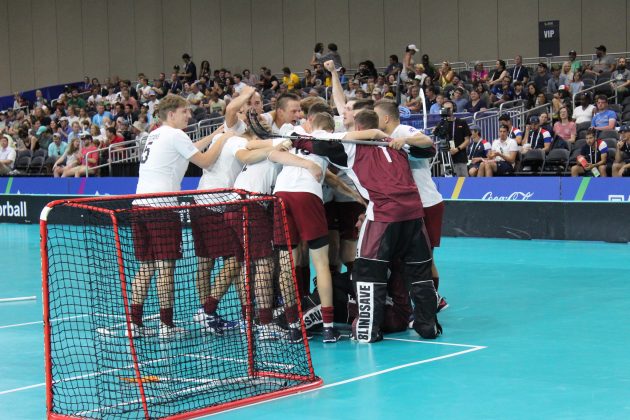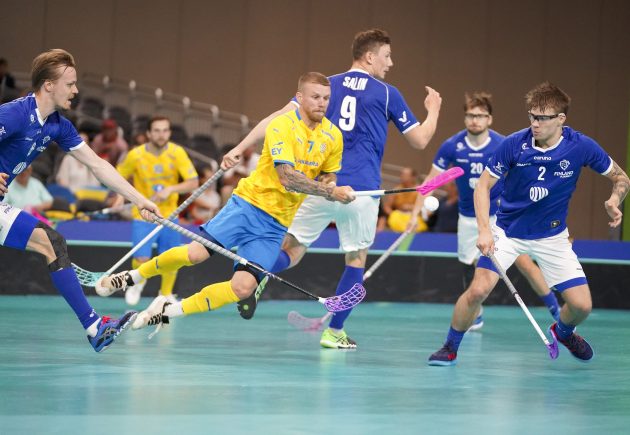
The Olympic motto – Citius, Altius, Fortius – Faster, Higher, Stronger – got an update in 2021 when the International Olympic Committee approved the addition of the word “together” – after an en dash to the motto. It now reads Citius, Altius, Fortius – Communiter. Floorball doesn’t officially dream of olympics anymore – at least for now – but the olympic motto fits any serious sport well. Aiming to be better is the core of every sport, right?
I revisit IFF’s three main points from my earlier post now that the World Games have been played, because World Games can perhaps be seen as the most important testing venue for the new rules.
1. “Closing the Gap from 1.-4. (ranking) to 5.-12. is one of the main reasons for doing the change – more even matches”
2. “Our product will be so much more fun to look at on higher level, active playing, more spectators”
3. “Multisport events – showing that we are willing to adjust to a more modern version (and Olympic opportunity)”
1. Closing the Gap – Latvia’s surprise results
The World Games medals were handed to the same three nations, in exactly the same order than in the last World Championships in Helsinki – Sweden with gold, Finland silver and Czech Republic took the bronze. No surprises here. The interesting outlier and change to “business as usual” was Latvia as they pushed Switzerland out of the TOP4. Latvia also shocked Sweden with a 6-6 draw in their opening game. Without a closer look, these can be seen as the result of proposed new rules – the underdog upsetting the favourites – and exactly what the international floorball needs and why we need new, reduced game time.
There were problems with streaming in Latvia vs. Sweden and therefore we don’t have advanced statistics from that particular game. However, we do have advanced statistics from Latvia vs. Switzerland provided by Floorball Scanner.

As we can see from the stats, Latvia was by far the better team in this game and fully deserved their win. Their xG on 5v5 was over two goals better than Switzerland’s – that is a significant difference. Switzerland came close with their power play but overall, there was no indicator that reason behind Latvia’s win was the reduced game time. Latvia performed well also later in the tournament and started their semi-final against Finland again as the better team.
When analysing the result, we also need context. With all respect towards the World Games, it wasn’t and it isn’t the main target for any of the participating teams (the hosts perhaps excluded). What follows is that the tournament was more or less a possibility to have some competitive games during pre season and perhaps test some players. That said, we shouldn’t take anything away from Latvia. They were well prepared, had good game plans and executed those plans with quality. Latvia’s young key players have also found good places to grow and develop further.
This should be emphasised – Latvia’s good performance was NOT a result of a reduced game time. It was a result of quality coaching process and strategy, committed players and a federation that have made a good choice when hiring their head coach Arto Riihimäki. Saying that Latvia’s results are exactly what IFF is after with their plans to reduce game time is undermining the real and actual work that has been done in Latvia.

2. Our product will be so much more fun to look at on higher level, active playing, more spectators
This is is one of the more subjective points IFF is trying to make. I wrote in June as follows:
“The games might have well been attractive in Wroclaw but a) the sample size is too small, b) the format was new to all teams and so the game plan and strategies were not fully developed and c) the World Games itself were not approached by TOP4 teams as their main goal. Games with less meaning to the teams can well be entertaining to watch but with higher stakes, the end product is very likely to be something else that was hoped. It also remains a mystery how exactly were the games “more fun to look at”? Higher xG in both ends? More challenges per minute? Longer running distance per player? What?”
We could now write that the games were pretty entertaining in Birmingham too but the same counter-arguments still apply. This was more or less a summer practice tournament for teams preparing themselves to the main event in November in Switzerland. However some new effects could be seen*.
*The sample size is still very small
A) Higher value of special teams
As the game time is reduced 25% but 2 minutes penalty stays the same, it means that 2 min penalty is proportionally more meaningful. Power play’s value is – depending on team – about 0,3-0,6 goals per power play. When we take 15 minutes away from the playing time, simple maths tell us that special teams will play a lot bigger role in 3×15 minute games.
B) Reduced value of 5v5
As the special teams play a bigger role, the value of 5v5 is naturally reduced. One new interesting consequence is that the “circus phase” – when a team is more or less desperately trying to score – can now take proportionally quite a big chunk of the game. Switzerland pulled their goalie against Latvia about 6 minutes before the full-time; Finland started to play without the goalie about 6-7 minutes before the end in the final. We have to take into consideration that the sample size is small and the context – WG is not the priority for anyone – but we could argue that the value of a team’s “level of basic 5v5 play” will be smaller. Whether one thinks this is a positive or a negative thing is more or less subjective. This might even be what the IFF is after.
C) Coin-toss results
Floorball is at its core quite an unpredictable game when two equal level teams play against each other. In the WG final Finland was ahead of Sweden about first 30 minutes (xG over one more than Sweden) but two quick Sweden goals followed by very high conversion rate of its chances meant that the time ran out quickly. Again, whether one thinks this is a positive or a negative thing is subjective.

Above mentioned are factual effects and consequences. Then there are second and third order consequences that we should try to analyse and predict. That would take a whole other long post, but few quick thoughts come to mind:
- Special teams play a bigger role -> more practice time towards special teams required -> more specialised players? -> More cautious approach when defending to prevent penalties? -> playing in the grey area?
- Reduced value of 5v5 -> less emphasis on 5v5 strategies -> more important for a player to be a specialist? -> effects on junior development?
- Referee decisions play a bigger role -> more money and resources to referee development? -> 3rd referees required?
- More unpredictable results -> reducing the meaning of preparation and training? Continuing to put resources towards national teams questionable as the results are unpredictable? Reducing the level of sports (performance)?
Making radical changes to the rules of the game should not be taken lightly. There should be thorough discussions about possible consequences – from first to second and third order consequences. Basketball coach and writer Harri Mannonen’s definition of basketball is as follows: “Basketball is an invasion team sport where the interaction between the two teams is confined by the basketball rules.” The same of course applies to floorball. When we change one of the basic rules of the game – the game time – there are many many consequences to consider and many that we are not even able to take into account.
The benefits of current rules are clear: the pros and cons are known. The benefits of a radical change are yet to be well and openly argued and analysed.
3. Multisport events – showing that we are willing to adjust to a more modern version (and Olympic opportunity)
Multisport events are seen by IFF as a very important part of making floorball bigger. With this we should perhaps take a step away from the game itself and examine this more from a marketing and branding point of view. Multisport events can be possibilities for new people to see floorball and as such, can be seen as valuable.
To put it kindly, The World Games 2022 was not a great success from IFF or whoever is responsible for the streaming and broadcasting. IFF at least should be the one who cares the most.
If IFF wants to get more and new people fall in love with the game, it matters how the game presents itself. The streaming, highlights and even information where to watch the games from Birmingham was below every possible par. Yes, I or some other floorball geek can and will watch bad streams with poor quality but will the person who doesn’t really know the sport? The potential sports consumer has A LOT to choose from.


And here we touch a thing that frustrates the writer of this post. IFF or if we want to share responsibility – WE, the floorball people – are not yet doing even the basics of basics at an adequate level. If this, strategically a big thing for floorball – The World Games, the mini olympics – is treated with such a poor level and care for the product, why are we even thinking that because the sport is not yet where we want it to be, there must be something wrong with the rules of the game? Or that the rules must be the thing holding us back?
God natt international floorball as we know it?
IF a person watches floorball for the first time AND if she loves what she sees AND IF that person wants to go and watch it live or even better, try it out themselves, there MUST be some games to watch or some place, perhaps a local club to try it out. We come back to the grassroots. If floorball doesn’t yet exist as a possibility in the environment the person lives in, that person will not be a potential new floorball person for long.
I assume that no one really thinks that shortening the game time will “close the gap” in any way. It will make the end results more unpredictable, at least at first.
There are no real shortcuts here. There is no silver bullet. I wrote in my last post “It is more than possible that when IFF has their General Assembly during men’s WFC in Switzerland in November, IFF’s Central Board will propose a change in game format (from 3 x 20 min to 3 x 15 min). General Assembly will have a vote and as every member association has one equal vote, the quite eager lobbying campaign for shorter games seems to have worked – as of today, Future of Floorball is very likely to be 3 x 15 minutes.”
IFF’s Central Board will meet in September and have discussions whether to propose the new game time to General Assembly. As of today, it seems that from TOP4 ranked nations in CB, Finland and Switzerland are against the change, Sweden and Czech Republic are for it. Really, the floorball people of Sweden? Really, the floorball people of Czech Republic?
Like I wrote in the beginning of this post, The Olympic motto catches the spirit of any competitive sport well: Try to be faster, aim higher, get stronger. What is the IFF trying to tell us with their plans?
”Get Lucky”?
Come on.

